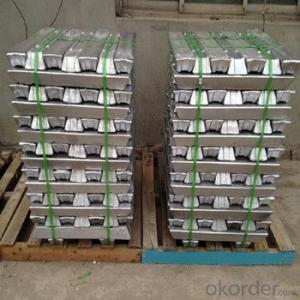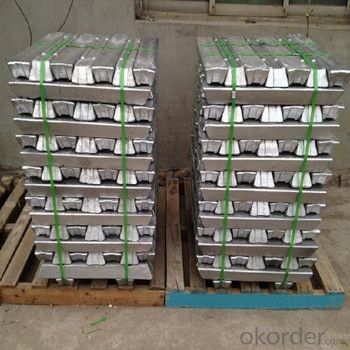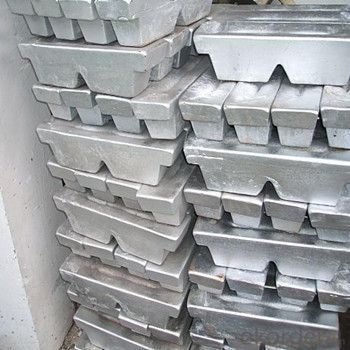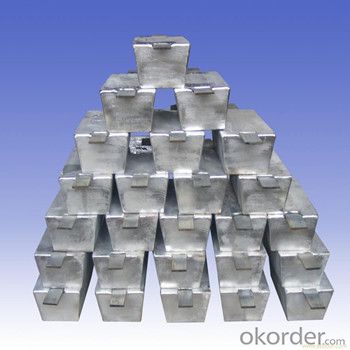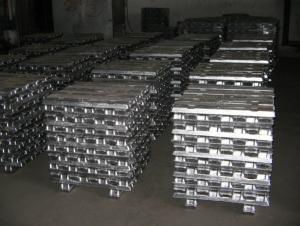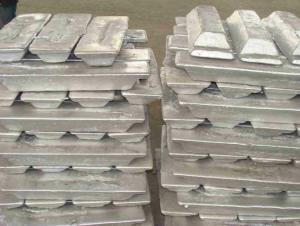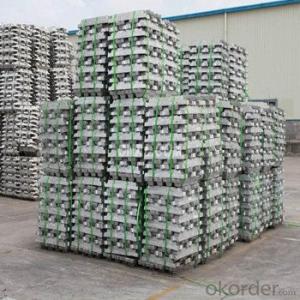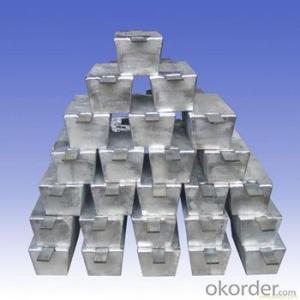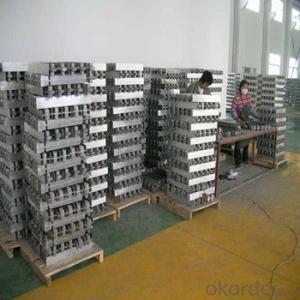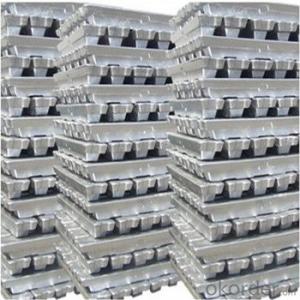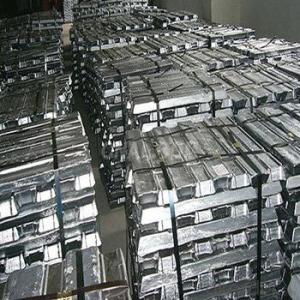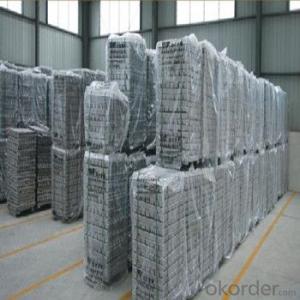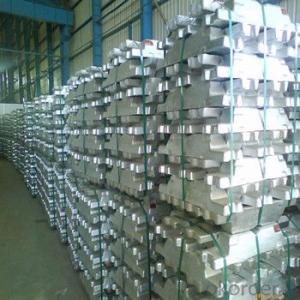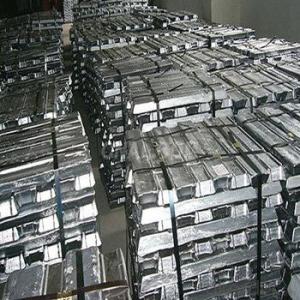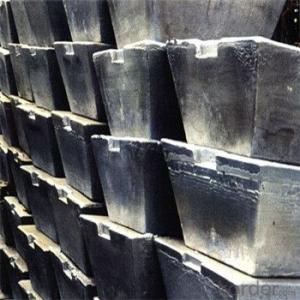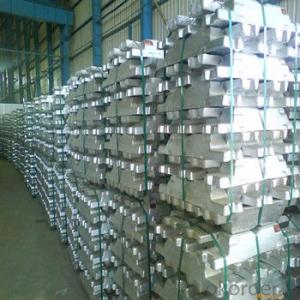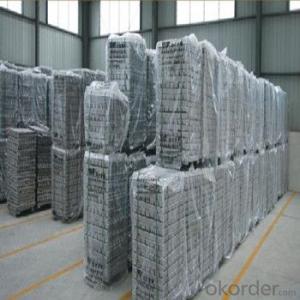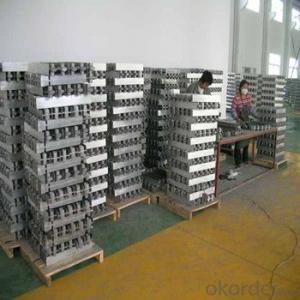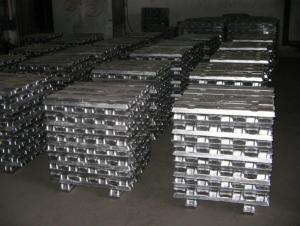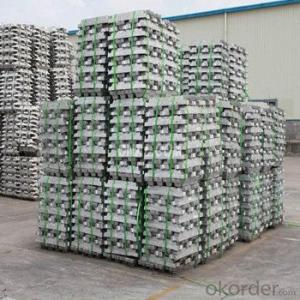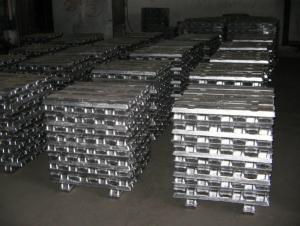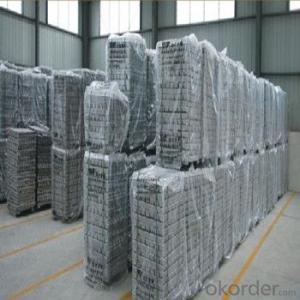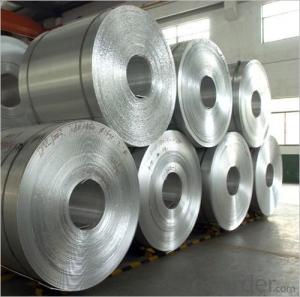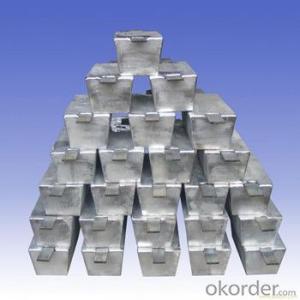Aluminium Ingot from China Hot-Sale with Good Price
- Loading Port:
- China main port
- Payment Terms:
- TT OR LC
- Min Order Qty:
- 1000 m.t.
- Supply Capability:
- 10000 m.t./month
OKorder Service Pledge
OKorder Financial Service
You Might Also Like
Pure Aluminum Ingot Used for Industry
1.Structure of Aluminum Ingot Description
Aluminum Ingot is with the AL as the main chemical composition. Aluminum Ingot is used for industry,such as automobile,pinning and weaving,electron broadly and so on. Aluminum Ingot has the following advantages: easy control and operation, fast melting.
2.Main Features of the Aluminum Ingot
•High Purity
•Easy control and operation
•High strength
•Fast melting
•Competitive price
•Best Service
3. Aluminum Ingot Images
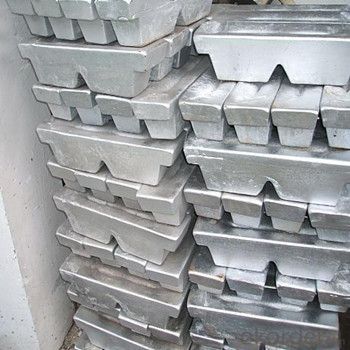
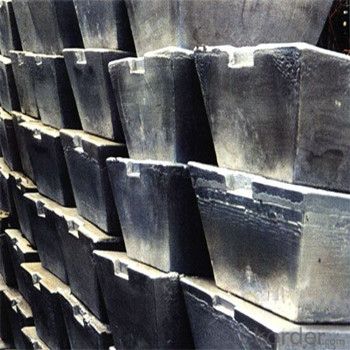
4. Aluminum Ingot Specification
Grade | Chemical Composition % | |||||||||
Al≥ | impurities ≤ | |||||||||
Si | Fe | Cu | Ga | Mg | Zn | Mn | others | Sum | ||
Al99.9 | 99.90 | 0.50 | 0.07 | 0.005 | 0.02 | 0.01 | 0.025 | - | 0.010 | 0.10 |
Al99.85 | 99.85 | 0.80 | 0.12 | 0.005 | 0.03 | 0.02 | 0.030 | - | 0.015 | 0.15 |
Al99.7 | 99.70 | 0.10 | 0.20 | 0.010 | 0.03 | 0.02 | 0.030 | - | 0.030 | 0.30 |
Al99.6 | 99.60 | 0.16 | 0.25 | 0.010 | 0.03 | 0.03 | 0.030 | - | 0.030 | 0.40 |
Al99.5 | 99.50 | 0.22 | 0.30 | 0.020 | 0.03 | 0.05 | 0.050 | - | 0.030 | 0.50 |
Al99.00 | 99.00 | 0.42 | 0.50 | 0.020 | 0.03 | 0.05 | 0.050 | - | 0.050 | 1.00 |
5.FAQ of Aluminum Ingot
We have organized several common questions for our clients,may help you sincerely:
①How about your company?
A world class manufacturer & supplier of castings forging in carbon steel and alloy steel,is one of the large-scale professional investment casting production bases in China,consisting of both casting foundry forging and machining factory. Annually more than 8000 tons Precision casting and forging parts are exported to markets in Europe,America and Japan. OEM casting and forging service available according to customer’s requirements.
②How to guarantee the quality of the products?
We have established the international advanced quality management system,every link from raw material to final product we have strict quality test;We resolutely put an end to unqualified products flowing into the market. At the same time, we will provide necessary follow-up service assurance.
③How long can we receive the product after purchase?
In the purchase of product within three working days, We will arrange the factory delivery as soon as possible. The pecific time of receiving is related to the state and position of customers.Commonly 7 to 10 working days can be served.
- Q: What are the dimensions of a typical aluminum ingot?
- The dimensions of a typical aluminum ingot vary, but they are commonly rectangular in shape and can measure approximately 20 inches long, 6 inches wide, and 3 inches thick. However, these dimensions can vary depending on the specific requirements and standards of the industry.
- Q: What type of spectrometer is used to analyze aluminium ingots?
- The spectrometer has many brands and many models, so you can't ask questions like that.
- Q: How much is the power consumption to smelt a ton of aluminium ingot?
- Theoretically, 1 tons of aluminium ingots are melted down, consuming 500 degrees
- Q: How are aluminum ingots used in the production of household appliances?
- Aluminum ingots are used in the production of household appliances as they can be easily molded into various shapes and sizes. They are commonly used to make the outer casings and frames of appliances such as refrigerators, ovens, and washing machines due to their lightweight, durable, and corrosion-resistant properties. Additionally, aluminum ingots are also used in the production of heat sinks and electrical components within appliances to dissipate heat efficiently and ensure optimal performance.
- Q: Can aluminum ingots be anodized?
- Aluminum ingots are capable of undergoing anodization. Anodization, an electrochemical procedure, yields a safeguarding oxide layer on the exterior of aluminum. This technique can be employed on aluminum ingots, sheets, or any other manifestations. Anodization boasts numerous advantages, including heightened resistance against corrosion, enhanced durability, and the potential to introduce color onto the surface. Moreover, the anodized layer enriches the aesthetic appeal of the aluminum and facilitates superior adhesion of paints or dyes. In summary, the anodization of aluminum ingots is a prevalent practice across diverse industries to augment both the properties and appearance of the metal.
- Q: What is the role of aluminum ingots in the production of aircraft?
- Aircraft production heavily relies on aluminum ingots because of their unique properties and characteristics. In essence, aluminum ingots, which are blocks or bars of pure aluminum, serve as the primary raw material for making various components and structures in aircraft. The outstanding strength-to-weight ratio of aluminum ingots is one of the main reasons why they are preferred in aircraft production. Aluminum is a lightweight metal, making it perfect for aerospace applications where reducing weight is crucial for fuel efficiency and overall performance. By using aluminum ingots, manufacturers can create lightweight parts that contribute to reducing the overall weight of an aircraft. This leads to improved fuel economy and increased payload capacity. In addition, aluminum ingots possess remarkable corrosion resistance, even in harsh environments. This property is particularly important for aircraft as they are exposed to different atmospheric conditions, including moisture, salt, and pollutants. Aluminum's corrosion resistance helps ensure the durability and longevity of aircraft components, leading to reduced maintenance costs and enhanced safety. Furthermore, aluminum ingots are highly malleable and easily shaped, allowing manufacturers to form them into desired aircraft components through various manufacturing processes such as forging, extrusion, and machining. This versatility enables the production of complex parts, such as fuselage panels, wings, and landing gear, with precision and efficiency. Aside from their mechanical properties, aluminum ingots also exhibit excellent thermal conductivity. This characteristic is valuable in aircraft applications as it helps dissipate heat generated by engines, electronic systems, and other components. By efficiently transferring heat away from critical areas, aluminum contributes to the overall thermal management of an aircraft, enhancing performance and preventing overheating. In conclusion, aluminum ingots are essential in aircraft production due to their lightweight nature, corrosion resistance, malleability, and thermal conductivity. These properties enable the manufacturing of strong, durable, and efficient aircraft structures and components, which ultimately contribute to the safety, performance, and reliability of modern aircraft.
- Q: How are aluminum ingots used in the production of electrical conductors?
- Aluminum ingots play a crucial role in the production of electrical conductors. These ingots are first melted down and then cast into various shapes, such as wires, rods, or strips, depending on the specific application. One of the main reasons aluminum is used in the production of electrical conductors is its excellent electrical conductivity. Aluminum has approximately 61% of the electrical conductivity of copper, making it a viable alternative in electrical applications. Additionally, aluminum is much lighter than copper, which brings benefits in terms of transportation and installation costs. To manufacture electrical conductors, aluminum ingots are typically processed through a series of steps. First, the ingots are heated and extruded to form long, continuous aluminum rods or wires. These rods or wires are then drawn through a series of dies to reduce their diameter and increase their length. This process is known as wire drawing and helps to refine the aluminum's microstructure, increasing its electrical conductivity. After wire drawing, the aluminum rods or wires are annealed to relieve any stress and improve their mechanical properties. Subsequently, the aluminum conductors may be further processed by applying a thin layer of insulation, such as a polymer or enamel coating, to protect against electrical short circuits and corrosion. Once the aluminum conductors are ready, they can be used in a wide range of electrical applications. These include power transmission and distribution systems, where aluminum conductors are commonly used for overhead lines. Aluminum conductors are also employed in electrical cables, such as building wiring or automotive wiring harnesses. In summary, aluminum ingots are an essential component in the production of electrical conductors. Through processes like extrusion, wire drawing, and insulation application, aluminum ingots are transformed into highly conductive and reliable components used in various electrical applications.
- Q: How can aluminum cans be made into aluminium ingots?
- High temperature; persistent high temperature
- Q: How much is a ton of aluminum now?
- According to the surface treatment of different ways, the price difference is much, generally speaking, is the price of aluminum ingot, plus every processing fee, aluminum ingot price is now 13000, plus processing fees in 3500 to 12000 yuan.
- Q: How are aluminum ingots used in the packaging industry?
- Aluminum ingots play a crucial role in the packaging industry due to their unique properties and versatility. These ingots are primarily used to manufacture various types of aluminum packaging materials such as cans, foils, containers, and lids. One of the primary uses of aluminum ingots in the packaging industry is for manufacturing aluminum cans. These cans are widely used for packaging beverages, including soft drinks, beer, and energy drinks. Aluminum cans are preferred over other materials due to their lightweight nature, which makes them easier to transport and stack. Additionally, aluminum cans provide excellent protection against light, oxygen, and moisture, ensuring the quality and freshness of the packaged product. Another common application of aluminum ingots in the packaging industry is for producing aluminum foils. Aluminum foils are used for wrapping food items, such as chocolates, snacks, and pre-cooked meals, as well as for sealing bottles and containers. The exceptional barrier properties of aluminum foils prevent the entry of air, moisture, and contaminants, thereby preserving the taste, texture, and overall quality of the packaged food. Aluminum ingots are also utilized in the manufacturing of aluminum containers, commonly known as trays or pans, which are extensively used for packaging ready-to-eat meals and takeout food. These containers are lightweight, durable, and can withstand high temperatures, making them suitable for both cooking and reheating. Additionally, aluminum ingots are employed in the production of aluminum lids and closures used in the packaging industry. These lids are designed to fit tightly on various packaging materials, ensuring the integrity and safety of the packaged products. Aluminum lids provide an effective seal, preventing leakage, contamination, and tampering. Overall, aluminum ingots are widely used in the packaging industry due to their excellent properties, including corrosion resistance, lightweight, and malleability. By utilizing aluminum ingots, the packaging industry can produce sustainable, durable, and high-quality packaging materials that meet the demands of modern consumers.
Send your message to us
Aluminium Ingot from China Hot-Sale with Good Price
- Loading Port:
- China main port
- Payment Terms:
- TT OR LC
- Min Order Qty:
- 1000 m.t.
- Supply Capability:
- 10000 m.t./month
OKorder Service Pledge
OKorder Financial Service
Similar products
Hot products
Hot Searches
